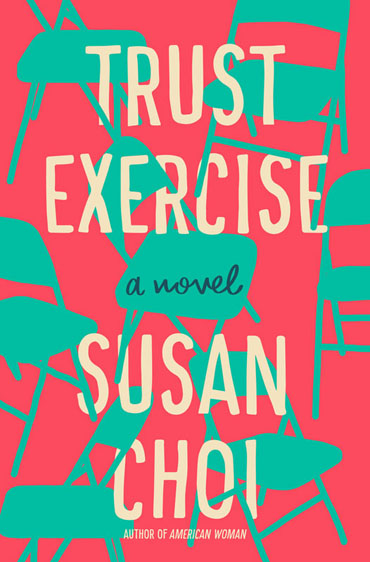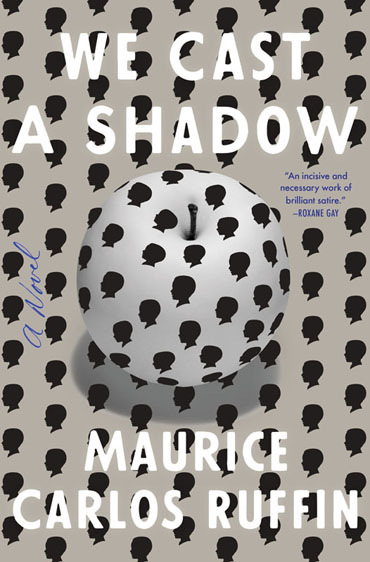Heather Cothran: Aug. 9, 2014, I was driving when I heard a snippet of a news story on the radio that caught my attention because it happened in Ferguson, the St. Louis suburb where I teach. When I learned that Michael Brown, an unarmed black teenager, had been shot and killed by a Ferguson police officer, I remember actually saying out loud, “Whoa, this is gonna get ugly.” That ended up being an understatement. As residents of Ferguson protested, throngs of people descended: more protesters, counter protestors, the police, the National Guard, the national news. The start of our school year ended up being pushed back by seven days, and I spent all of my extra free evenings compulsively checking Twitter for the latest updates as the suburb that I taught in, the suburb that I lived 10 minutes away from, burned.
I think the silverest of linings to this nation’s extreme divide is the satirical art made in response to it. I was very intrigued by the premise of We Cast a Shadow, and it certainly got off to an audacious start with three black associates of a prestigious law firm competing to be bumped up to senior partner. The winner would be the one most willing to embody the most egregious racial stereotypes for their white colleagues’ amusement. The writing was funny, biting, wild; I felt I was in for a hell of a ride.
But even before I finished the first chapter I was experiencing moments of confusion. The novel’s unnamed narrator says that his boss, Octavia, is “one of the good ones,” but then describes a fantasy she has in which she wears blackface and commits crimes, and then pins them on “some thug who actually had it coming.”
The narrator’s white wife, Penny, does seem like “one of the good ones,” even as she clashes with the narrator about his obsession with getting a procedure to reduce his biracial son Nigel’s dark birthmark, or shows her naiveté about the realities of their world. In the narrator’s words: “She understood the dangers of structural inequality. She knew the value of dismantling systematic injustice. But when it came to the basis of walking through life as prey, she had no idea.”
The narrator’s relationship with his wife and son became my favorite aspect of the novel, but the further I read, I felt increasingly unmoored. Big events take place that seem completely unconnected to anything that has come before; characters come and go; provocative ideas pop up in one chapter, never to be discussed again. On a sentence level, there is much to admire. “America could cheer someone else’s brown boy down a field, and, after he’d wrecked his body and mind, into an early grave” is the kind of insightful rebuke on which an entire novel could be based, and the English teacher in me delighted to see one chapter end with a nod to William Carlos Williams: “Overturned red wheelbarrows. So much depends on a man with a hatred of his own.” But I could barely keep up the thread of the actual story, and by the end I felt I had read a lot of interesting ideas and well-phrased observations that didn’t quite gel.
I was intrigued by what I knew about Trust Exercise as well. A puzzle-like novel with dramatic twists and turns set in a high school for the performing arts? Yes, please! Before I went back to college to be a teacher, theatre was my first college major. Mr. Kinglsey tells his students in the novel, “If you ever spell this (theatre) with an ‘ER’ at the end you will fail the assignment,” and I was taught the same lesson, although it was delivered less harshly. I found as much to cringe at as relate to, though, in the chapters that followed. It felt claustrophobic at times, the hyper-depiction of all of the most embarrassing thoughts and actions of a bunch of horny teens in this hothouse of a setting. I mean, “they’re both shocked to find themselves copulating in a public space of their high school?” That makes me want to call the cops and scratch out my mind’s eye.
But I stayed invested in the story of Sarah and David, the star-crossed sophomores and aforementioned hallway copulators, because a lot of those cringeworthy thoughts and actions felt almost too real. Then in part two, I became invested in another story and began to realize there was an explanation why parts of the first section seemed over the top or melodramatic. There were also lines that broke my heart in this novel with their clear-eyed depiction of the human need for love and connection, like, “She couldn’t even see that pure joy on his face which she caused. Which is too bad, because some of us never get looked at that way.” OOF. And when I followed it all the way to the end, I felt like I had followed a trail of breadcrumbs to a surprising but somehow inevitable conclusion, as opposed to being on a carousel of interesting set pieces with no true center—which is what We Cast a Shadow began to feel like more and more as the novel progressed.
I’m not thrilled that I wasn’t able to connect more to the narrator’s story in We Cast a Shadow, because I must admit his feelings about his wife and the limits of her understanding of his experience apply to me as well. Certainly, this is something I grapple with as a white teacher of African-American students in Ferguson. It does make me question my ability to accurately judge a novel that is so specifically about an experience of life I can never fully understand. Ultimately, though, I had to choose one to advance, and I felt I must vote for the novel that kept me in its spell throughout, that revealed more to me on a reread instead of confusing me further.
From our match sponsor: It’s new-release Tuesday! Among today’s releases are The Glass Hotel by Emily St. John Mandel and The City We Became by N.K. Jemisin. You can order these books and plenty more from Quail Ridge Books with FREE SHIPPING. Quail Ridge Books is proud to be a sponsor of the Tournament of Books, and we hope to be around to sponsor many more; thank you for supporting community bookstores!
Match Commentary
By Kevin Guilfoile & John Warner
John Warner: Trust Exercise was one of, if not the, favorite of the year for me. That said, I may never have picked it up, or having started it, persisted, if not for the review of the book by Laura Miller at Slate. If not for getting a little heads-up about the twist in the book, I might’ve been thwarted by the intationally “overripe prose” (Miller’s words) of the first section. The tenor of the prose is ultimately one of the most remarkable aspects of the novel, but an unprepared reader may find it just a bit too much, which is the point after all.
Kevin Guilfoile: Every year in the ToB we find themes (or synchronicities or motifs) that run through the shortlist. I’d like to suggest this is by design, but the selection process is simply not that nine-dimensional. This year it seems like books are pairing up in interesting ways outside of the scheduled matchups. Earlier I suggested that Golden State and Mary Toft would make a good coupling. Reading Trust Exercise in the context of the ToB, you can’t help but think it would make a fine companion to Normal People. Both books explore the intimate relationships of very young people, and they cover some of the same associated frustrations and mistakes and cruelty. In my opinion, Normal People is slightly better at exploring the internal lives and motivations of its characters; Trust Exercise does more interesting things with story. I imagine the Venn overlap of people who would like both of these novels is large. I’m certainly subscribed to both groups.
Another thing about Trust Exercise is that the sex is fairly explicit, and I mention it only because it pushes that envelope to the point where I think it becomes risky for the author. Explicit sex in literary novels is just dicey, and there’s a popular award that exists only to make fun of it. My theory about why literary sex is so often terrible is that sex is such a singular experience it defies metaphor. As soon as you start reading that sex “is like” something else (like, for instance, “manipulating a small monkey that was curling up its paws,” as last year’s winner of the Bad Sex in Fiction Award claimed) your reflexive reaction is to say to yourself, no it isn’t and then start giggling. (It doesn’t help that lovemaking’s inherent resistance to similes encourages writers to stretch them even more than they usually do.)
Choi avoids that trap, though. Even within the book’s narrative conceit (which she might have considered a license to gamble even more recklessly), her sex scenes remain closely tied to her characters’ relative inexperience and properly convey their mixture of lust and confusion.
John: If anyone has read Choi’s earlier novel, My Education, they’ll see she’s got lots of sex writing under her belt. Like Trust Exercise, My Education is designed to explore narrative tropes while being a wholly satisfactory story in its own right. Trust Exercise is a tricky book this way, as evidenced by the significant polarization in consumer reviews at Amazon. A full quarter of its 200-plus ratings are one-star, suggesting a good proportion of readers feel thwarted by the approach. A lot of the Commentariat in the opening round was nonplussed by it, even those who recognized Choi’s conceit to write the first section in the overheated style of a so-so author.
What can I say, I dig that stuff, big time.
Kevin: Judge Cothran praises We Cast a Shadow for all the things it does well—it’s funny and shocking, it hits its targets, the writing is excellent—but had trouble connecting with the story. I had a similar experience. Writing book-length satire is hard: It’s like juggling a chainsaw, a jellyfish, and a flaming bag of poo. Keeping it going for 300 pages is almost impossible. When that happens it’s glorious, but it doesn’t happen often. I really enjoyed We Cast a Shadow for all the things it does do right, but I would have signed on to the judge’s decision here.
As we wrap up the quarterfinals, we need to flip through the Zombie spreadsheets and can see that We Cast a Shadow does not have enough reader votes to make it to the Zombie Round. It’s not over yet, but as of today, Normal People and On Earth We’re Briefly Gorgeous remain our contending corpses. We Cast a Shadow’s pursuit of the Rooster ends here.
Semifinals tomorrow! Saudade will meet Lost Children Archive. Judge Ratik Asokan will preside, and ToB Reader Judge finalist Maggie Schneider will enter the commentary booth immediately following, joined by our own Andrew Womack.
New 2020 Tournament of Books merch is now available at the TMN Store. As a reminder, Sustaining Members receive 50 percent off everything in our store. To find out why we’re asking for your support and how you can become a Sustaining Member, please visit our Membership page. Thank you.
Welcome to the Commentariat
Population: You
To keep our comments section as inclusive as possible for the book-loving public, please follow the guidelines below. We reserve the right to delete inappropriate or abusive comments, such as ad hominem attacks. We ban users who repeatedly post inappropriate comments.
- Criticize ideas, not people. Divisiveness can be a result of debates over things we truly care about; err on the side of being generous. Let’s talk and debate and gnash our book-chewing teeth with love and respect for the Rooster community, judges, authors, commentators, and commenters alike.
- If you’re uninterested in a line of discussion from an individual user, you can privately block them within Disqus to hide their comments (though they’ll still see your posts).
- While it’s not required, you can use the Disqus
tag to hide book details that may spoil the reading experience for others, e.g., “ Dumbledore dies .” - We all feel passionately about fiction, but “you’re an idiot if you loved/hated this book that I hated/loved” isn't an argument—it’s just rude. Take a breath.




